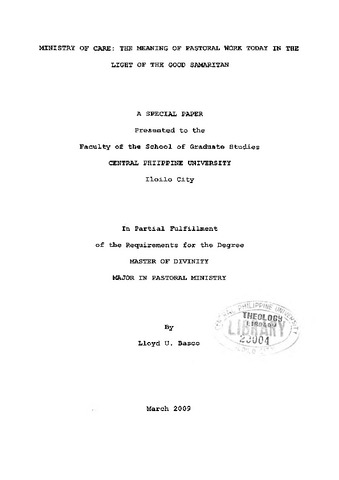| dc.description.abstract | In his short time here on earth, Jesus showed deep love and concern to every person. He taught and commanded his disciples to care for the sick and the needy. The Christians during those times ministered to each other and helped carry each other's burdens. Carrying each other's burdens was known to be the symbol of true Christian love.
Caring for each one, therefore, is not a new idea or an exclusively western idea. It is a biblical notion based on what Jesus modeled and taught and it has also been exemplified throughout church history.
One concrete example as related to the topic of the Good Samaritan is found on John 4:1-26, here we can see that Jesus ministered to a Samaritan woman. In this scenario, the writer noticed two barriers that would have hindered Jesus from ministering to the woman.
The first barrier would be the "bad-blood" between the Jews and the Samaritans. The Samaritans were hated by the Jews chiefly because their ancestors had come from marriages of Jewish and non-Jewish parents. In addition, in Jewish eyes the Samaritans were bastards, for that same reason that those who escaped deportation to Assyria in 722 B.C. mingled and intermarried with pagans. And years before this parable was told, sometime between 9 and 6 B.C. the Samaritans defiled the Temple area to prevent the Jews from celebrating the Passover feast and they did this so by scattering human bones all over the courts of the temple. And in reply to such desecration and blasphemy, the Jews annihilated their Temple in the year 128 B.C. found on Mount Gerizim. Because of such intense hatred, the Jews did not mingle or associate with the Samaritans. The second barrier would have been the patriarchal society during those times, wherein a woman was not allowed to go out unveiled in public or speak to a man. Rules of propriety forbade a man to be alone with a woman, to look at a married woman, or even give her a greeting and in general it was considered preferable for a woman, and especially to an unmarried girl, not to go out at all.
In the history of the church, in the book of Acts we can see that the believers united in desire and in thinking, they sold their possessions and entrusted all the proceeds from the sales to the apostles. The apostles then distributed to the one's who greatly needed them and as the result of such unity, no not one was seen to be needy among them.
Moreover, in Macedonia, the Gentile Christians showed great compassion towards the saints in other churches. In spite of the terrible persecution that they encountered they still managed to give beyond their ability to give and even the apostle Paul was astonished, for he did not expect that they would give even more than what they ought to give. They were terribly persecuted but nevertheless it did not matter to them, they were never shaken or hindered by such circumstances but instead they sacrificially gave to those with great need. What they have modeled simply shows that they have taken to heart the teachings of Christ.
Caring for those in need may include several goals, including changing the person's attitudes, values or beliefs in life, preventing more serious problems from developing, teaching social skills, encouraging expression of emotions, giving support in times of need, guidance in decision making, teaching certain responsibilities, stimulating spiritual growth, and helping the person to utilize his or her own inner strength and resources in times of crisis. As one belonging to God's Kingdom, the pastor and the whole community of believers are given the task of caring for those in need. It is the pastor and the whole Christian community's tasks to administer pastoral care to the dying, the bereaved, the troubled, the disheartened, to people in conflict and to everyone with great needs.
But it is a sad fact that the previous statements and examples are scarcely happening in our modern times. A lot of churches have detached themselves from the ministry of caring. It breaks the writer's heart to see that a lot of ministries or "mega-churches" these days, are no longer into the helping and caring ministry but they have spent most of their time and effort beautifying their churches.
They utilize expensive materials and spend millions of dollars for their church structures. Beautifying church structures is a good thing but if it is given more focus than the caring ministry or the missionary work then it becomes a problem.
To make matters worse, several of those big ministries even solicit help from third-world countries. This is not the kind of ministry that God requires from His people. This should not be. The idea of sacrifice is no longer present in this type of ministry. This is a tricky form of worldliness, it may look right in other people's eyes but if we dig deeper we can see that the desire is now more on prestige but not in glorifying God. This is indeed a great contradiction or an opposite of what the Scriptures tell us. | en_US |


